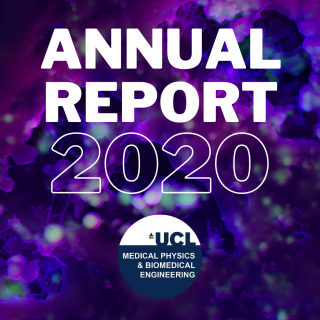Spotlight: Catharine Clark, Honorary Professor
2 February 2021
In this interview we get to know Dr Catharine Clark, who joined the Department of Medical Physics & Biomedical Engineering in December 2020.

Dr Catharine Clark’s research focuses on improving clinical standard’s in the field of radiotherapy, particularly for clinical trials. Catharine joins UCL Medical Physics & Biomedical Engineering as Honorary Professor of Translational Radiotherapy Physics, a joint role held with UCLH, National Physical Laboratory and RTTQA (RadioTherapy Trials Quality Assurance Group). We spoke to Catharine about her research plans, her career so far and her role as Chair of the ESTRO Physics Committee.
Welcome to UCL! What are you most looking forward to about being here?
UCL has an amazing combination of departments, so the opportunities for collaboration are second to none. I am most looking forward to contributing to the collaborations between UCL and UCLH.
Also, I was a student at UCL and did my PhD in this department with Prof Robert Speller, so I am very pleased to be back home, so to speak.
What is your new role at UCL and what will your work focus on?
I am an Honorary Professor of Translational Radiotherapy Physics.
The development and implementation of advanced radiotherapy techniques require validation and standardisation, especially when used in clinical trials. My work focusses on methodologies for independent assessment of these techniques, with the aim to raise standards and harmonise approaches.
Your new role is a joint post with UCL Medical Physics and Biomedical Engineering, UCLH, National Physical Laboratory and RTTQA (RadioTherapy Trials Quality Assurance Group). What do you think the benefits of a joint position are, and can you briefly describe how the different institutions intersect?
The Department of Medical Physics at the National Physical Laboratory, the Radiotherapy Quality Assurance for Clinical trials group, the Medical Physics department at UCL and UCLH are all striving to ensure that the quality of the radiotherapy delivered to patients is the highest possible. Each has it’s own perspective on this challenge, but with the same common goal. My role is to identify where each can best support the others. The benefit of holding a joint position is that it creates opportunities for me to link expertise from the individual institutions to provide unique solutions to different clinical challenges.
What have been the greatest challenges and highlights of your career so far?
I think I have similar challenges to others in trying to create the best work-life balance. Balancing raising three kids with developing my career has not always been straight forward, but it is certainly highly rewarding. This is not my first joint post and learning how to optimise my role between the clinical, industrial and academic environments, whilst minimising the inevitable challenges has taken time.
For me the most rewarding highlight has been contributing to trials which have changed clinical practice in radiotherapy. The UK is a world leader in randomised clinical trials and to be able to help to ensure that they are run with the highest standards is a huge privilege.
I have also been very lucky to have had opportunities to work abroad both in France at the Institut Gustave Roussy and at Stanford University Hospital in California, where I made many friends who I still catch up with at conferences, and I continue to work with colleagues across Europe with ESTRO.
You are the Chair of the ESTRO Physics Committee – can you tell us a bit about that?
I joined the European Society for Therapeutic Radiology and Oncology (ESTRO) in 2001 and after working on the young committee, I joined the Physics committee in 2014, becoming the chair in 2019. The physicists in ESTRO are very active and we have a very wide range of activities from focussed workshops, courses, congresses and guidelines, through to developing European core curricula for training Medical Physics Experts and liaisons with other international societies. My role as chair of the committee is to ensure that all these activities culminate in outcomes which are internationally beneficial to the Medical Physicists working in Radiotherapy.
 Close
Close


